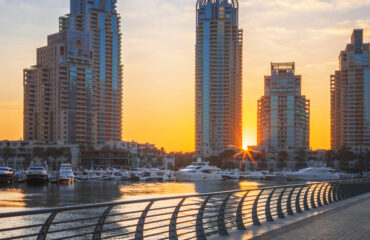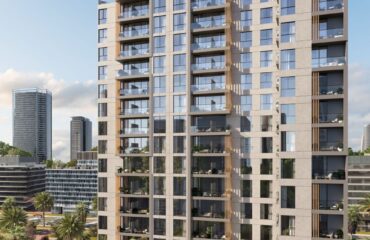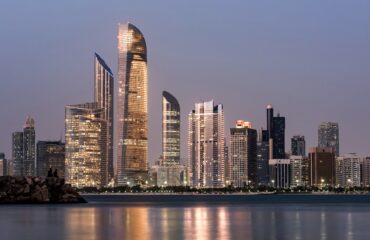
Expert tips and strategies for 2024
Dubai has established itself as a leading global real estate investment hub, offering attractive returns, world-class infrastructure, and a tax-free environment. Whether you’re a first-time buyer or an experienced investor, understanding how to invest in Dubai real estate is crucial for making informed decisions that maximize your returns.
Grovy Real Estate has been at the forefront of Dubai’s property market, providing expert advice to both local and foreign investors. This guide will walk you through every aspect of investing in Dubai’s real estate, from legal requirements to market trends and financing options.
For personalized investment strategies and exclusive listings, contact Grovy Real Estate today.
The benefits of investing in Dubai property
Why Dubai is a top real estate investment destination?
Dubai’s strategic location, coupled with its continuous economic growth, makes it a prime location for real estate investments. Here are the key reasons why investors should consider Dubai:
- Tax-free environment: Investors benefit from no property taxes or capital gains taxes, which ensures higher profitability.
- High rental yields: Certain areas offer rental yields as high as 8-10%, significantly higher than other global cities.
- Stable economy: Dubai’s economy is robust and diversified, attracting both residents and businesses, which ensures strong real estate demand.
- Growing infrastructure: With continual infrastructure development, including new transportation links and entertainment hubs, Dubai’s property market is expected to see long-term growth.
Dubai’s real estate market trends for 2024
Dubai property market outlook
Dubai’s real estate market is poised for strong growth in 2024, driven by increasing property sales, values, and continued demand for luxury and high-end properties. In July 2024 alone, property sales reached AED 49.6 billion, marking a significant 31.63% increase compared to the same period in 2023.
This surge is supported by both domestic and international investors who are seeking stable returns in a highly resilient market. As Dubai welcomes more developments, it’s expected that the supply of new properties will rise dramatically over the next couple of years, with 41,000 units projected for 2025.
However, experts believe that the market will be able to absorb this influx due to strong demand and strategic urban planning. Investors are also turning towards mid-tier and affordable property segments, offering potential high rental yields and robust investment opportunities.
Additionally, technological advancements such as AI-driven market analyses and virtual property tours are enhancing transparency and accessibility, making the property buying process more efficient for investors. This combination of high demand, steady growth, and innovation makes 2024 an attractive year for investors in Dubai’s real estate market.
Types of real estate investments in Dubai
When it comes to how to invest in Dubai real estate, there are multiple options to consider, each with its own benefits:
- Buy-to-let properties: Ideal for investors seeking long-term rental income, these properties are located in high-demand residential areas such as Dubai Marina and Downtown Dubai.
- Off-plan investments: Investors can purchase properties under construction, benefitting from flexible payment plans and potentially higher returns upon completion.
- Short-term rentals: The rise of platforms like Airbnb has increased the appeal of short-term rentals, offering higher returns during peak tourism seasons.
- Commercial real estate: Dubai’s business hubs offer opportunities for investing in office spaces and retail units.
Freehold vs leasehold: What’s the difference?
Understanding freehold and leasehold properties in Dubai
Freehold properties grant full ownership to investors, including the land the property stands on. In contrast, leasehold properties are typically leased for up to 99 years, with ownership reverting to the original landlord afterward. Foreign investors can purchase freehold properties in designated areas such as Palm Jumeirah and JVC, providing more security and long-term ownership options.
Dubai’s Real Estate Investment Laws for Foreigners
Can foreigners invest in Dubai real estate?
Yes, foreigners are allowed to invest in Dubai real estate within freehold zones. Popular freehold areas include Downtown Dubai, Dubai Marina, and JVC. Additionally, those who invest over a certain threshold (usually AED 750,000 or more) are eligible for a UAE residency visa, making Dubai an attractive destination for global investors.
Key Documents and Processes for Investors
Legal requirements for property investors in Dubai
To invest in Dubai real estate, both local and foreign buyers must present key documents, including:
- Passport and visa: A valid passport and, for residents, a valid UAE visa.
- Proof of funds: Evidence that you can fund the purchase, usually in the form of bank statements.
- Sales agreement: An official contract registered with the Dubai Land Department, ensuring the legality of the transaction.
Grovy Real Estate ensures that all paperwork and legal procedures are handled smoothly, allowing you to focus on your investment.
How to Finance Your Investment Property in Dubai
Mortgage options for real estate investors
Both expats and UAE nationals can access competitive mortgage products in Dubai. Expats are typically offered Loan-to-Value (LTV) ratios of up to 75%, while UAE nationals may receive up to 85% financing. Grovy Real Estate partners with leading financial institutions to offer tailored mortgage plans, ensuring you get the best deal based on your investment needs.
Payment Plans for Off-Plan Properties
Understanding developer payment plans
For investors who prefer off-plan properties, developers like Grovy offer flexible payment plans that allow for installments during the construction phase. This makes off-plan investments attractive as they minimize upfront costs while providing future appreciation.
Costs Involved in Buying Property in Dubai
What are the hidden costs of investing in Dubai real estate?
Apart from the purchase price, investors should account for additional costs such as:
- Registration fees: 4% of the property’s value, paid to the Dubai Land Department.
- Service charges: Annual fees for maintenance of communal areas and building services.
- Agency fees: Typically 2% of the property’s purchase price.
Top Locations for Real Estate Investment in Dubai
Best areas to buy investment property in Dubai
Investors looking for high returns and capital appreciation should consider these prime locations, tailored to different investment goals:
- High-rental yield areas: Dubai Marina, Jumeirah Village Circle (JVC), and Business Bay are top picks for those seeking high rental yields. They are known for their vibrant communities, proximity to key business districts, and strong rental demand.
- Luxury investments: Palm Jumeirah and Downtown Dubai remain unbeatable options for those looking for high-end, luxury properties. These areas offer upscale amenities, iconic landmarks, and exclusive waterfront views, making them attractive for high-net-worth individuals.
- Affordable investments: If you’re seeking more affordable options with strong growth potential, Dubai Sports City and Al Furjan are ideal. Areas such as these offer competitive prices and are developing rapidly, attracting investors and residents alike.
Upcoming Areas with High Growth Potential
Where to invest in Dubai in 2024
Emerging areas such as Dubai Hills Estate and Dubai South are expected to offer significant growth potential in the coming years. These developments boast excellent connectivity and world-class amenities and are well-positioned for long-term capital appreciation. Grovy Real Estate has expertise in these upcoming neighborhoods, helping investors secure the best opportunities in a growing market.
Step-by-step guide on how to invest in Dubai real estate
Step 1: Define Your Investment Goals
How to set clear investment objectives
Before diving into the Dubai property market, it’s important to define your investment objectives. Are you seeking rental income or long-term capital appreciation? Grovy Real Estate can help you set realistic goals and find properties that align with your financial plans.
Step 2: Research the Market and Location
How to find the best property for investment in Dubai
Researching the market and identifying the best areas is critical to a successful investment. Whether you’re looking for high rental yields or future growth potential, Grovy provides exclusive access to some of the city’s best real estate deals.
Step 3: Arrange financing or set a budget
Budgeting for your Dubai property investment
Before making a real estate investment in Dubai, it’s essential to create a clear budget. Start by determining how much you can afford to invest based on your available capital and mortgage eligibility. Here are some tips to help with budgeting:
- Evaluate your savings: Review your current financial situation, ensuring you have enough for the down payment, closing costs, and other potential expenses. Typically, expats in Dubai need to pay a minimum of 20-25% of the property price as a down payment.
- Mortgage eligibility: Speak with mortgage providers to understand how much you qualify for based on your income, assets, and existing debts. Most banks offer up to 75-80% of the property value for non-residents and up to 85% for UAE nationals.
- Factor in additional costs: Don’t forget to budget for other costs such as property registration fees, agent commissions, maintenance fees, and utility setup charges. These can add up to around 5-7% of the property’s value.
Step 4: Hire a reputable real estate agent
Why you need Grovy Real Estate for your investment
Working with an experienced real estate agent is essential when investing in Dubai’s property market, and Grovy Real Estate can provide that crucial expertise. With a deep understanding of the local market, we offer valuable insights into the best locations, upcoming developments, and market trends.
Step 5: Conduct property viewings and due diligence
How to perform due diligence before buying property
Before finalizing any real estate investment, it’s crucial to conduct thorough property viewings and due diligence to ensure you’re making a sound decision. Here’s how to approach this step:
- Evaluate the Property’s Condition: Visit the property in person to inspect the quality of construction, layout, and amenities. Pay attention to any maintenance or repair needs that may incur additional costs.
- Research the Developer’s Reputation: Look into the developer’s track record for delivering high-quality projects on time. Grovy, for example, has established a reputation for delivering premium residential developments like Aria and Alcove with exceptional attention to detail.
- Legal Checks: Ensure the property has clear legal standing. Verify ownership, check if there are any outstanding debts or disputes, and review the project’s compliance with Dubai’s regulatory standards.
Step 6: Make an offer and finalize the deal
How to close the deal on your investment property
After completing due diligence and finding the right property, the next step is to make an offer and close the deal. Here’s how to go about it:
- Submit an offer: Once you’ve decided on a property, work with your agent to submit a competitive offer to the seller. Grovy Real Estate can assist with negotiating terms that benefit you, such as securing a favorable price or including additional amenities.
- Sign the agreement: Upon agreement, both parties will sign a Memorandum of Understanding (MOU), which outlines the terms of the sale, including payment schedules and any special conditions. Typically, a 10% deposit is paid at this stage.
- Transfer ownership: After the payment is made and all documents are in order, the final step is to transfer ownership through the Dubai Land Department. This process includes paying a 4% transfer fee and registering the property in your name.
Key Risks to Consider
Potential risks in Dubai property investments
While Dubai’s market offers lucrative returns, investors should be aware of certain risks such as market fluctuations, off-plan project delays, and over-leveraging. At Grovy, we ensure you’re well-informed and equipped to mitigate these risks, helping you make sound investments.
How to mitigate risks?
Strategies to reduce investment risks
Real estate investments carry some risks, but there are effective strategies to reduce them. One method is diversifying your portfolio by investing in different property types like residential, commercial, or off-plan projects. This helps spread risk across various sectors, reducing the impact if one underperforms.
Another approach is investing in established areas such as Downtown Dubai or Dubai Marina, where the market is stable and growth is more predictable. It’s also essential to work with trusted developers like Grovy Real Estate to ensure your investment is backed by a reputable company with a history of delivering quality projects on time.
The rewards of investing in Dubai real estate
Long-term benefits of real estate investment in Dubai
Dubai real estate offers high returns on investment through rental yields and capital appreciation. Popular areas like Dubai Marina provide steady rental income. Another reward is that investors may be eligible for residency visas when purchasing property above a certain threshold, offering long-term residence benefits.
Additionally, Dubai’s property laws are transparent and investor-friendly, protecting your investment through well-regulated processes. The city’s strategic growth and global appeal also ensure strong, long-term demand for properties, making it a resilient market for investors.
FAQs on how to invest in Dubai real estate
- What is the minimum investment required for real estate in Dubai? The minimum investment starts at AED 750,000 for property purchases, which may also qualify you for a UAE residency visa.
- Can I get residency if I invest in Dubai real estate? Yes, by investing AED 750,000 or more in Dubai real estate, you may be eligible for a UAE residency visa.
- What are the best locations for rental yield in Dubai? High-rental yield areas include Dubai Marina, Business Bay, and Downtown Dubai.
- How much are property taxes and fees in Dubai? Dubai does not have property taxes, but buyers should account for registration fees, agency commissions, and service charges.
Start your real estate investment journey in Dubai with Grovy Real Estate
Investing in Dubai’s property market offers great potential, from high rental yields to long-term capital appreciation. At Grovy Real Estate, we provide the guidance, expertise, and exclusive opportunities you need to make informed investment decisions. Whether you’re looking to buy an off-plan property or secure a high-end villa, we’re here to help.
Contact Grovy Real Estate today for personalized strategies on how to invest in Dubai real estate and gain access to the best property deals in the city.








